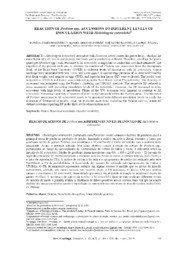Reaction of Psidium spp accessions to different levels of inoculation with Meloidogyne enterolobii.
Reaction of Psidium spp accessions to different levels of inoculation with Meloidogyne enterolobii.
Author(s): OLIVEIRA, P. G. de; QUEIROZ, M. A. de; CASTRO, J. M. da C. e; RIBEIRO, J. M.; OLIVEIRA, R. S. de; SILVA, M. J. L. da
Summary: Meloidogyne enterolobii associated with Fusarium solani causes the guava decay, which is the main factor of yield loss in guava crops and limits guava production in Brazil. Therefore, searching for guava genotypes (Psidium spp.) with resistance to M. enterolobii is important to control this root-knot nematode. The objective of the present work was to evaluate the reaction of Psidium spp. accessions from the Germplasm Bank of the Bahia State University (UNEB) to different levels of inoculation with M. enterolobii. Guava seedlings were inoculated with 600, 1,600, and 2,000 eggs + J2 second stage juveniles of M. enterolobii and the root fresh weight, total number of eggs (TNE), and reproduction factor (RF) were evaluated. The results were subjected to ANOVA and means were clustered using the Scott-Knott test at 5% probability. The diversity of accessions was estimated using the Tocher's clustering and UPGMA methods. The nematode RF reduced in some accessions with increasing inoculation levels of the nematode. However, the RF increased in some accessions with high levels of inoculation. Plants of the Y50 accession were immune or resistant to M. enterolobii, indicating variability of reaction of plants to the nematode within the Psidium genus. The resistance of Psidium accessions to M. enterolobii needs to be measured with different inoculation levels to verify the existence of false-positive results, since the evaluated accessions, including the Paluma cultivar, presented distinct reactions regarding RF in the three levels of inoculation used.
Publication year: 2019
Types of publication: Journal article
Unit: Embrapa Semi-arid Region
Observation
Some of Embrapa's publications are published as ePub files. To read them, use or download one of the following free software options to your computer or mobile device. Android: Google Play Books; IOS: iBooks; Windows and Linux: Calibre.
Access other publications
Access the Agricultural Research Database (BDPA) to consult Embrapa's full library collection and records.
Visit Embrapa Bookstore to purchase books and other publications sold by Embrapa.

